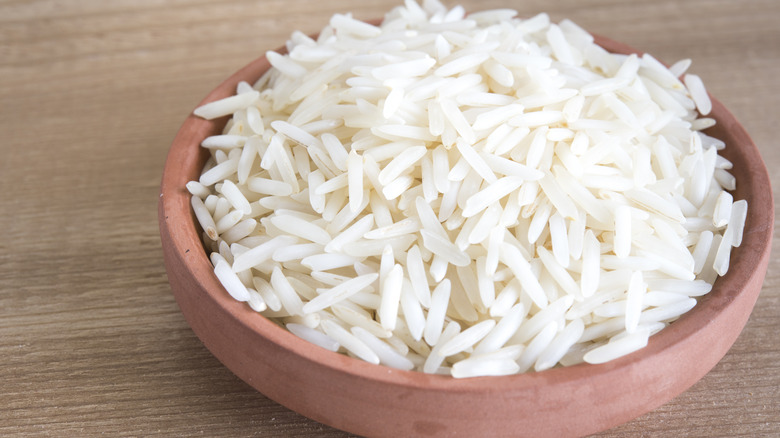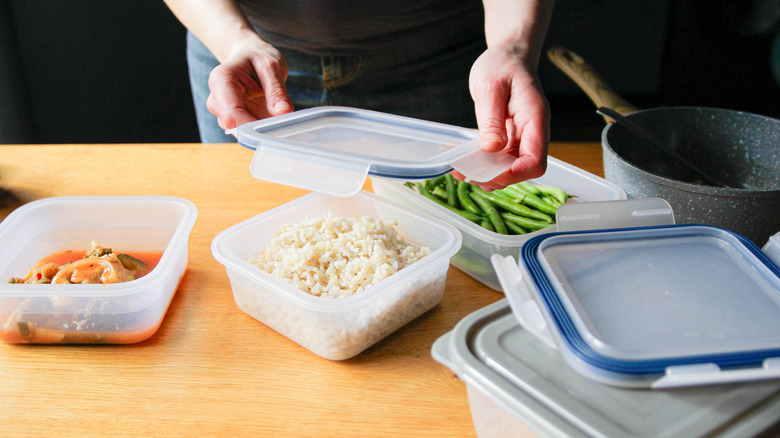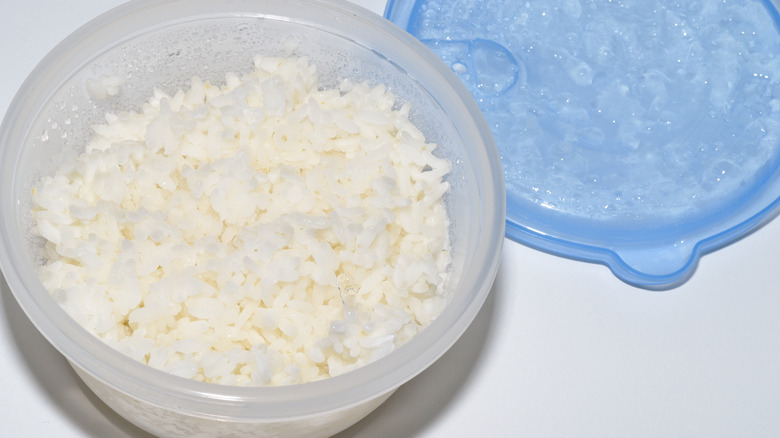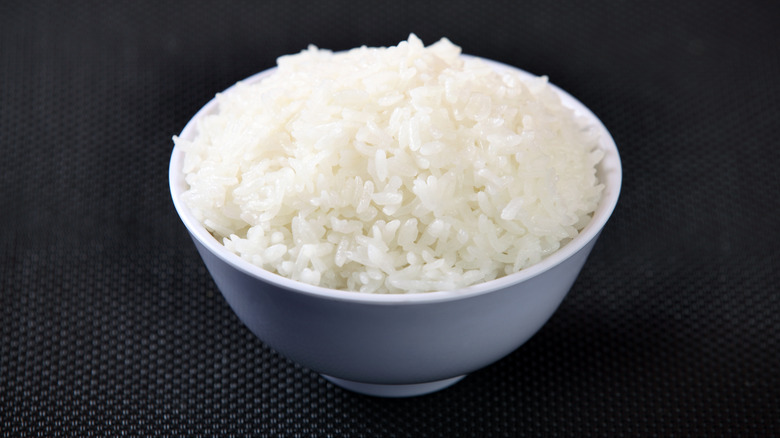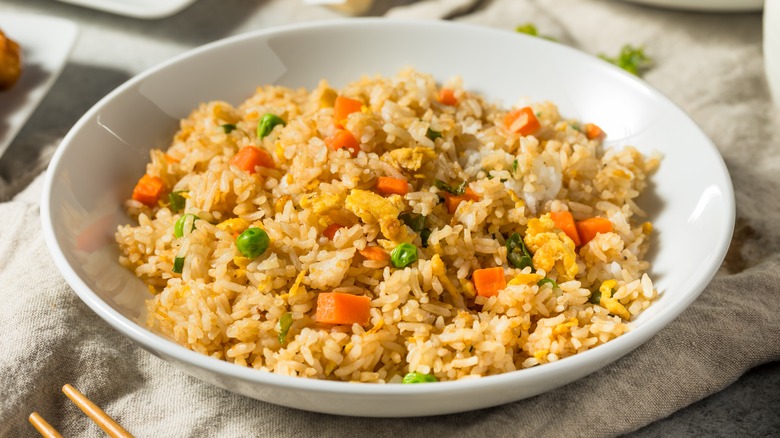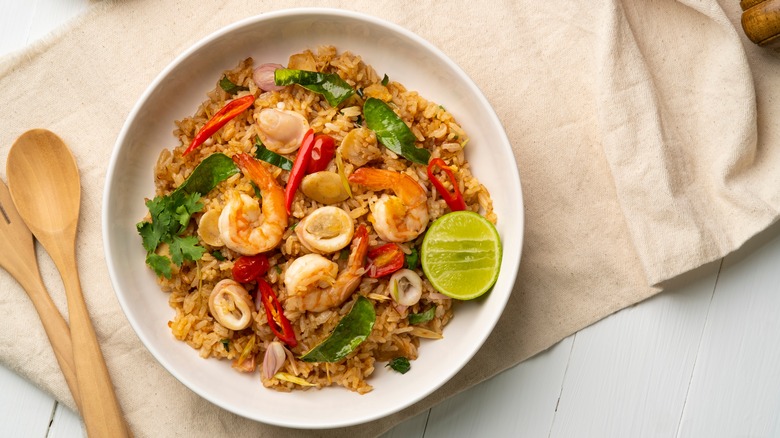Can You Freeze Cooked Rice?
Some things are just better fresh rather than frozen. Certain foods, such as chili or cookie dough, do well in the freezer even for extended periods, but this is not always the case for all foods. Some simply lose their luster upon freezing and are best served as close to fresh as possible. Rice is one of those foods. Though on the surface the tasty grain may seem like a perfect candidate for freezing — it is easy to cook in large batches and serves as the perfect base for many recipes — you'd be better served cooking your rice as you go or keeping leftovers in the fridge for short periods.
It is perfectly safe to freeze cooked rice, but the texture will change after it's been frozen, as the food does not hold up upon reheating. This is because the cell walls of rice break down upon thawing, causing your perfectly cooked, fluffy rice to take on an unpleasant mushy texture. The thawed rice will also lack flavor. It's a dish that is best served immediately after cooking.
How to freeze cooked rice
Despite its drawbacks, frozen rice can be helpful when it comes to cutting down on time in the kitchen. Rather than cook rice each time you plan on incorporating it into a meal, freeze a batch and reheat it for meals that can mask the texture — like soup or stew. Or, if you don't mind eating frozen rice instead of freshly cooked rice, you can reheat it when you make dishes like stuffed peppers, burritos, and protein bowls.
But before you start meal planning, you should know the best way to freeze cooked rice. Shortly after cooking it, spread the rice out onto a baking sheet and stick it in the fridge to cool down. After it's chilled, you can divvy up the rice into whatever portions you'd like, scooping them into Ziploc bags or airtight containers. Then you're ready to put the rice into the freezer.
How long is frozen rice good for?
Frozen rice should be eaten within one month after you've placed it in the freezer. After the one-month mark, the rice becomes too dry to enjoy. So, when storing cooked rice in the freezer, be sure to mark the date when you cooked it.
The best ways to reheat your rice
Reheating rice is more complex than simply plopping it in the microwave. If you're hoping to reheat your rice and maintain its taste and texture, you might consider implementing a few of these reheating methods.
If you're in a pinch for time, one method you might want to try is microwaving your rice with an ice cube. Doing so will help your reheated rice retain moisture, and the ice cube when placed in the microwave, will produce steam that helps to perk up your rice rather than dry it out. However, this method does not perfectly retain your rice's texture, and your resulting rice might still end up being a bit chewy.
If you have a bit more time on your hands, you might try reheating your rice in the oven. For this method, you will want to put your rice in an oven-safe dish and add a few tablespoons of water. Then, you should cover your rice in foil and put it in an oven preheated to 300 degrees Fahrenheit for 20 minutes. This method will help to steam the rice and help to maintain its texture. However, nothing will ever beat fresh rice.
Can you freeze fried rice?
Okay, we've gone over the basics when it comes to freezing plain cooked rice, but what about fried rice? The answer: Yes, you can freeze fried rice, but it's only good for about a month. As you'd do for regular cooked rice, you should cool the fried rice in the fridge before portioning it out into airtight containers or Ziploc freezer bags.
You should eat fried rice within a day or two after you've reheated it.
Be careful with leftover rice
While you can create some tasty results from reheating your rice, it's important to consider safety when consuming leftovers, especially when it comes to rice. Leftover rice can play host to the incredibly dangerous Bacillus cereus, a bacteria that can cause food poisoning. This is particularly important to note for cooked rice kept at room temperature for extended periods, as the bacteria can thrive and cause severe illness. Refrigerated rice can become hazardous to eat after only one day.
For this reason, it might be best to eat your leftover rice as soon as possible to avoid contamination. And even though it is impossible to maintain that fresh rice flavor and texture when reheating, you can still make the most of your leftover rice by playing to its strengths. Day-old rice might make a better base for fried rice than fresh rice does thanks to its slightly drier texture. So rather than freezing your leftover rice, you might want to plan on cooking it in a dish of fried rice, in which you can incorporate other leftover ingredients to create a delicious, somewhat eclectic meal.
